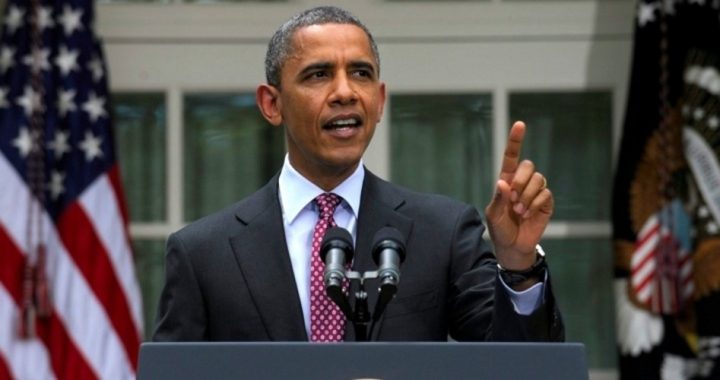
At a Rose Garden press briefing on June 15, President Barack Obama announced his administration’s intent to “mend our nation’s immigration policy.”
In what is described by many as the opening of a back door to amnesty, President Obama ordered that,
Effective immediately, the Department of Homeland Security is taking steps to lift the shadow of deportation from these young people. Over the next few months, eligible individuals who do not present a risk to national security or public safety will be able to request temporary relief from deportation proceedings and apply for work authorization.
In defense of his pronouncement, the President said that this program is “not amnesty, this is not immunity. This is not a path to citizenship. It’s not a permanent fix. This is a temporary stopgap measure that lets us focus our resources wisely while giving a degree of relief and hope to talented, driven, patriotic young people.”
The President insists that those who will now be granted this reprieve from deportation are “for all intents and purposes … Americans — they’ve been raised as Americans; understand themselves to be part of this country.” This is likely a concept that the President so warmly embraces as he has been plagued since the announcement of his candidacy for President with allegations that he is himself not a “natural born citizen” as required by Article II of the Constitution.
Unfortunately for President Obama and for those he has now promised protection from removal from the United States, citizenship in the United States is not defined by how one feels about himself, where he was raised, or even where he was born. In fact, a person could have been born in the crown of the Statue of Liberty and still not be a “natural born citizen” as defined by law.
Briefly, the relevant clause of the 14th Amendment reads:
All persons born or naturalized in the United States, and subject to the jurisdiction thereof, are citizens of the United States and the States wherein they reside.
The principal architect of the citizenship clause of the 14th Amendment was Michigan Senator Jacob Merritt Howard, a Republican representing Detroit.
Senator Howard crafted much of the language that was eventually ratified as part of the 14th Amendment.
During the debates that embroiled the Senate in years following the Civil War, Senator Howard insisted that the qualifying phrase “subject to the jurisdiction thereof” be inserted into Section 1 of the 14th Amendment being considered by his colleagues. In the speech with which he proposed the alteration, Howard declared:
This amendment which I have offered is simply declaratory of what I regard as the law of the land already, that every person born within the limits of the United States, and subject to their jurisdiction, is by virtue of natural law and national law a citizen of the United States. This will not, of course, include persons born in the United States who are foreigners, aliens, [or] who belong to the families of ambassadors or foreign ministers accredited to the Government of the United States, but will include every other class of persons.
How could a person “born in the United States” be simultaneously a citizen and a “foreigner” or “alien” if the mere fact of nativity settled the question of citizenship?
Another legislator commenting at the time of the ratification of the 14th Amendment, Representative John Bingham, provided the following clarification of the meaning behind the “subject to the jurisdiction thereof” clause: “Every human being born within the United States of parents not owing allegiance to any foreign sovereignty is, in the language of your Constitution itself, a natural born citizen.”
As the foregoing analysis makes clear: When applied to the case of the current President, and those to whom he has now removed from the rolls of possible deportation orders, the principles of constitutional law and legislative history reveal that regardless of the location of a person’s birth, the more relevant inquiry is whether the person’s father (or mother) was an American citizen at the time of the child’s birth. If the person’s father was not an American citizen and thus a person with legal allegiance to a foreign power, that person does not conform to the accepted definition of “natural born citizen,” regardless of his feelings on the matter.
Moreover, there is another important constitutional consideration not being covered by the mainstream media’s analyses of the President’s address. The question that has yet to be asked (until now) or answered is from which article or amendment of the Constitution does the President or Congress derive their authority to mandate immigration policy? A plain reading of the authority given by the states to the central government reveals that no such grant was ever made.
Disregarding the legal realities of citizenship, President Obama plans to implement his plan immediately, and as noted above, he has ordered the Department of Homeland Security to stand down with regard to its deportation of those covered by the President’s policy. DHS Secretary Janet Napolitano ran immediately to her boss’s defense. “This grant of deferred action is not immunity, it is not amnesty,” Napolitano told reporters. “It is an exercise of discretion so that these young people are not in the removal system.”
Of course, the discretion as to whether or not one should be subject to the law (regardless, it must be added of one’s opinion as to the rightness or applicability of that law) cannot be left to each individual without creating a sort of relative anarchy, removing our nation from its constitutional and republican moorings and leaving it adrift in a sea of moral and legal relativity.
Regarding the potential for lawlessness in President Obama’s immigration announcement, one Republican senator tweeted that “this type of policy proposal, regardless of motivation, will entice people to break our laws.”
In an earlier tweet, Senator Lindsey Graham (R-S.C.) wrote that President Obama’s attempt to go around Congress and the American people is at best unwise and possibly illegal.”
According to a statement issued by the Department of Homeland Security, the policy change applies to all who entered the United States prior to age 16 and who are younger than 30, provided they have resided in the United States for five years, have a clean criminal record, and are high school graduates or veterans of the armed forces. Published estimates indicate that nearly 800,000 immigrants who came to the United States illegally will be included in this exemption.
These guidelines are remarkably similar to those set out in the Development, Relief, and Education for Alien Minors (DREAM) Act. That measure has been proposed several times in both houses of Congresses but each time it has failed to overcome Republican challenges.
Curiously, Republican presidential candidate and presumptive nominee Mitt Romney has refused to say whether he would “repeal” President Obama’s immigration order if he were elected President. Romney told Face the Nation that he would grant “permanent residence” to those illegal immigrants who have served in the military.
With June 15th’s Rose Garden reprieve, President Obama has enacted by executive fiat much of what the people’s representatives refused to do legislatively, an overt violation of the Constitution’s separation of powers. Ironically, in a 2011 speech to a Hispanic advocacy group, President Obama informed the audience that the Constitution prevented him from affecting immigration reform. “I know some people want me to bypass Congress and change the laws on my own,” the President said. “That’s not how our system works,” he added. “That’s not how our democracy functions. That’s not how our Constitution is written.” Apparently, electoral expediency trumps the President’s fidelity to his oath of office.
With June 15th’s announcement and others, President Obama has proven that he will not be hemmed in by constitutional restrictions on his power. In his speech on immigration, the President promised that he would not give up on this issue and that he believes that “eventually, enough Republicans in Congress will come around to that view as well.” If they don’t, it’s a sure bet that he’ll just keep on issuing decrees defying both the Constitution and the will of the people’s representatives in Congress.
Photo of President Obama: AP Images



